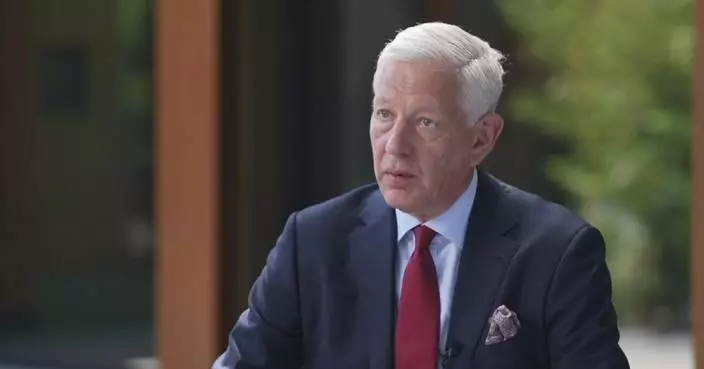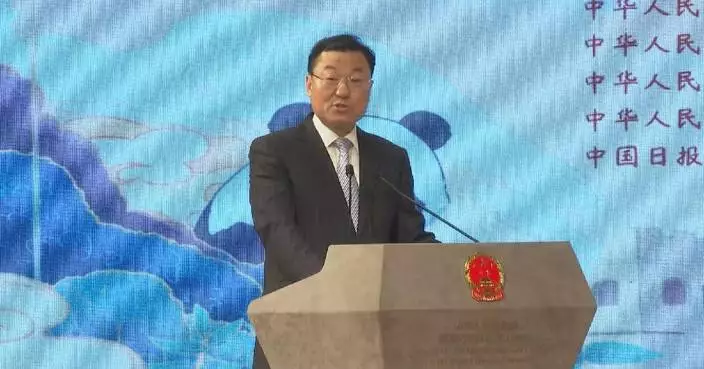Montargis, a scenic town in central France, carries important prints of the Communist Party of China (CPC) in its early days as it hosted Chinese students under a work-study program a century ago, who later played key roles in China's revolution and reform.
Located about 100 kilometers south of Paris and accessible via an hour's train ride, Montargis is affectionately known as "Little Venice" for its picturesque rivers and canals, blending natural beauty with profound historical significance.
In 1919, following World War I, hundreds of progressive young Chinese came to France to learn about Western culture and politics through a work-study program. While many stayed in Paris and Lyon, a group of them settled in Montargis, where they engaged with Marxist ideas, gaining popularity in France at the time.
Among these students were future Chinese Premier Zhou Enlai, leader Deng Xiaoping, and early CPC leader Cai Hesen. Their experiences in France profoundly shaped their later contributions to Chinese revolution and governance.
A century later, the connection between France and China was commemorated with the opening of the Historical Museum of French-Chinese Friendship in an old house at the town's center.
"A hundred years ago, these young people sought to change China and the world," said Wang Peiwen, the museum's curator.
The museum now serves as a hub for cultural exchanges, preserving the enduring legacy of those bygone days.
Strolling through Montargis, the town's rich history with China is ever-present, with several monuments and memorials commemorating its extraordinary role.
A square in the town is even named after Deng Xiaoping, while a bronze memorial commemorating the work-study program outside the railway station is a constant reminder of the town's links to modern China. It's a legacy the people here are determined to keep alive.
"I strongly support friendship between our cities and between our people, because we want peace. We are currently working on accelerating and promoting exchanges between young people, young musicians, and high schoolers," said Benoit Digeon, mayor of Montargis.

French town carries early prints of CPC
The Russian auto market has undergone a major shift in recent years,with Chinese brands surging in popularity and now capturing over half of new car sales in Russia.
Following Russia's conflict with Ukraine, major companies from Germany, the U.S., South Korea, and Japan ceased official sales, supplies, and services in the country, leading to a significant increase in prices for their cars and spare parts.
This void has been filled by Chinese car brands, whose market share in Russia surged to over 60 percent in 2023, nearly doubling from the previous year. In contrast, China held just a 9 percent market share in February 2022.
Ekaterina, an owner of a Chinese car who switched from a European brand, cited the complications in servicing her old car after Western car brands exited the Russian market. She highlighted the stability of Chinese car prices as a key factor behind her decision.
"A year ago, many people had concerns about whether to switch to a Chinese-made car and some of my friends decided to do so. People looked at the car, listened to the pitch, and made the choice naturally because the price is stable," she said.
Sergey Tselikov, director of the analytical agency Avtostat, predicts further growth in 2024, as Chinese companies have already exported record volumes of cars to Russia.
"First, almost all other brands have stopped supplying to Russia. Automakers in South Korea, Japan, Europe and the U.S. have halted supplies amid fears of sanctions," said Tselikov.
Tselikov also pointed to the significant quality improvements in Chinese car manufacturing over the past five to seven years as another reason for their popularity in Russia.
The share of dealerships selling Chinese cars in Russia witnessed a remarkable increase, rising from 31 percent to 65 percent in 2023, while the number of models and modifications continues to expand. Chinese automakers have even re-purposed some factories previously used by Western car manufacturers.
Russia is also encouraging localization efforts, hoping to revive its own car manufacturing industry.
"The [Russian] Ministry of Industry and Trade and the government are stimulating and trying to ensure that the cars are not only imported but assembled in Russia and then hopefully localized. In Russia, this is a problematic endeavor because it is very difficult to produce cheaper components in Russia than those produced in China," said Tselikov.
Russian companies are seeking collaboration with Chinese firms to domestically assemble Chinese cars. Moskvich, a long-established Soviet-era car company, has started assembling Chinese cars under its own brand.

Chinese cars reshape Russia's auto industry as Western brands scale back










